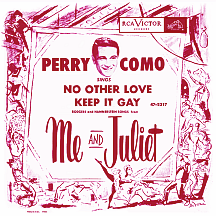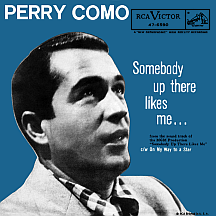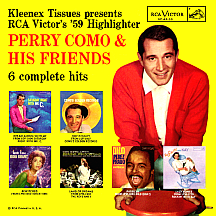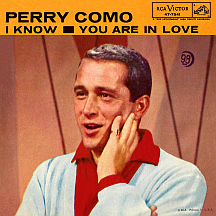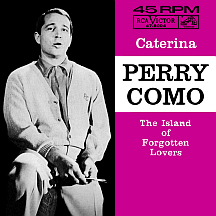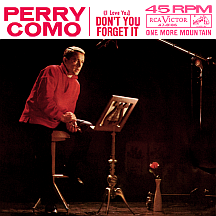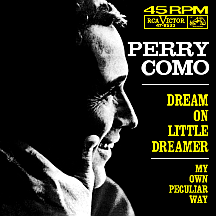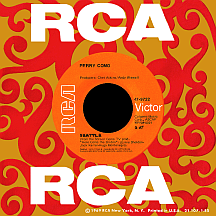PERRY COMO
"Nice guys finish last," a well-worn phrase, has an odd ring of truth to it. But there are exceptions. In Perry Como's case it's quite nearly the opposite, as the entertainer dubbed "Mr. Nice Guy" ranks as one of the most popular singers of the 20th century. I'm not exaggerating; Bing Crosby, Frank Sinatra and Elvis Presley are the only artists with just slightly more pop hits to their credit than the 130-plus chart singles posted by Perry between the early 1940s and mid-'70s, while his TV variety series' 15-year run near the top of the ratings underscores the accomplishment.
His parents arrived from Italy and settled in Canonsburg, a quiet town a short distance to the south of Pittsburgh in the lower west corner of Pennsylvania, about a decade before Perry (born Pierino Ronald Como), one of 13 children, arrived in 1912. He was the seventh son of a seventh son...the power to go straight to the top was his by default, if one is to believe superstitious lore; he paid little mind to the notion. Bing, Frank and Elvis could have formed a triad at the top of music's heap without interference from any other...but maybe there was something to all this seventh son hocus-pocus!
As a youngster, Perry decided on barbering as a profession after witnessing his laborer father's hardship. By age 14 he was running a small shop, singing while cutting hair and harmonizing on weekends at local events in a barbershop quartet. A musician with multiple skills (piano, trombone, guitar), he was a stickler for following proper musical form, finding out much later that many professionals don't read music or even have the desire to do so. There were two great pop crooners coming up through the ranks of Philly-born, L.A.-based Gus Arnheim's band when Como was nearing the end of his high school years. Russ Columbo broke through on record and film in 1928; Bing Crosby (and the Rhythm Boys) joined Arnheim's band in 1930 after a few years with Paul Whiteman. Both singers greatly influenced Como's style while impacting his decision to drop the shears and head down the showbiz path.
He passed an audition for Cleveland bandleader Freddie Carlone and was off and running...though the pay was less than he made as a barber. At about the same time, he married hometown girl Roselle Belline, proving you don't necessarily have to impress a girl with your well-paying job if you sing like Bing in a big band...or into a megaphone like Rudy Vallee, which Perry did despite its becoming dated by 1933, when he started rolling with Carlone. The band was strictly a touring outfit without a record deal; Perry often moonlighted as a solo act in Cleveland nightclubs, making more money off tips than he did with Carlone. His recording career got under way in 1936, shortly after he joined another Pennsylvanian, Ted Weems, and his wildly popular band based in Chicago. He debuted on disc that year with Weems' "You Can't Pull the Wool Over My Eyes" on Decca, the B side of "Let's Sing Again" with Weems' star whistler Elmo Tanner. Como's sound branded him a "Crosby Copycat" in his early days, an assessment even he would own up to.
After scoring a few hits ("Goody Goodbye" in 1940, "It All Comes Back to Me Now" in '41 and "Deep in the Heart of Texas" in '42), Perry tired of the comparisons to Bing, who'd by that time become the biggest-selling singer of the music industry's first half-century with over 150 pre-Billboard hits in the 1930s alone. Returning to Canonsburg, Perry set about resuming his simpler life as a barber. But does a "Seventh Son" ever truly have freedom of choice? Tommy Rockwell of the Rockwell-O'Keefe talent agency, which represented several of music's top stars, noticed Como's absence and contacted him, only to find out he was on the verge of putting up a permanent barber pole. Tommy offered to set him up in New York with a solo recording contract, substantially doing away with the rigors of touring. With support from Roselle, Perry took the plunge.
In the spring of 1943, Columbia Presents Perry Como made a splash as a 15-minute daily show on CBS radio. He avoided singing Bing's songs, received good reviews, and gained a large audience. In June he debuted at the prestigious Copacabana nightclub. His easygoing stage presence made him unique and RCA Victor offered a contract within days of the first Copa show, mainly on the premise that Decca already had Crosby and Columbia had just signed Sinatra. On June 20, right in the middle of the historic strike by the American Federation of Musicians, which effectively banned all members from making recordings (though singers were free make a cappella recordings), "Goodbye, Sue," written by Jimmy Rule of Nashville with Louis Ricca and Jules Loman, was recorded with an angelic-sounding female backing chorus; the sentimental ballad enjoyed modest sales. Como reached the top ten with the Jerome Kern-Ira Gershwin tune "Long Ago (And Far Away)" from the musical film Cover Girl starring Rita Hayworth and Gene Kelly, though other versions (by Jo Stafford, Helen Forrest and Dick Haymes and Crosby) were bigger sellers.
All doors opened to Como thanks to Rockwell, who helped him negotiate a lucrative deal to star in more than a dozen movies for 20th Century-Fox for a total take of more than a million dollars. In the spring of '44 he headed to Hollywood to shoot his first film, Something For the Boys, a musical with Carmen Miranda. Right away he felt disoriented, preferring the instant reaction of nightclub audiences to the cold quiet of a movie soundstage, longing for the safety of his east coast confines. It wouldn't be the last time he would endure such torture. This uncomfortable situation was mixed with welcome news: the musicians' ban was lifted later in the year, enabling him to again make records with orchestras. He'd moved his family to Queens and began a new quarter-hour radio program on NBC, Chesterfield Supper Club, alternating nightly hosting duties with Jo Stafford.
Summertime arrived with his biggest hit so far, the Richard Rodgers-Oscar Hammerstein II Broadway musical centerpiece "If I Loved You" from Carousel. Suddenly the single was overshadowed by Como's first number one hit, "Till the End of Time," Buddy Kaye and Ted Mossman's lyrical adaptation of Frederick Chopin's classic "Polonaise" (its timing a little late for early '45's A Song to Remember, Columbia Pictures' biopic on Chopin that marked Cornel Wilde's career peak); the single topped the Billboard best sellers from September through November...and Perry was in the big leagues!
His second film, released late in the year, brought him down from his high sonic perch; Doll Face, another middling musical with Miranda and Vivian Blaine, made Perry so miserable he began plotting ways to break his movie contract. Even the early '46 smash from the film, Harold Adamson and Jimmy McHugh's trendy "Dig You Later (A Hubba-Hubba-Hubba)," was of concern to Perry, who disliked these types of novelty tunes but went ahead with them anyway; for years he would record songs he felt were best filed in the waste can only to see them rise to high chart positions. Sponsors sometimes played a role in an artist's career; "Dig You Later" and the next hit, "I'm Always Chasing Rainbows," were among several singles with credited backing by vocal group The Satisfyers, their name a plug for the radio show's sponsor, Chesterfield cigarettes (after the brand's famous tag line, "They Satisfy").
1946 had its high and low points. "Prisoner of Love," a 1932 Russ Columbo song and one of Perry's all time favorites, was successfully revived, becoming his second number hit in May. He purchased a home on Sands Point, a scenic part of Long Island within an hour's commute to Manhattan; it provided a permanent home for his family for more than two decades. Offsetting this longed-for stability was the September release of his third film, If I'm Lucky, another cringeworthy musical (at least as far as he was concerned) again teaming him with Vivian Blaine and Carmen Miranda. Reviews of his acting weren't bad, but he got the feeling he was better off being heard and not seen. Then "Surrender," one of the biggest compositions by Bennie Benjamin and George Weiss, returned Perry to number one in August.
Another chart-topper arrived in June '47, the gentle "Chi-Baba Chi-Baba (My Bambino Go to Sleep)," penned by the prolific Mack David, Jerry Livingston and Al Hoffman; backing vocals came courtesy of the respelled Satisfiers. The flip, James Thornton's "When You Were Sweet Sixteen," reached number two, making it Como's biggest two-sided hit. "I Wonder Who's Kissing Her Now," a 1939 recording he'd done with Weems for Decca, was a major hit in the summer and fall; a new version for RCA was used as the theme for a film with the same title starring June Haver. Perry badly wanted out of his own movie contract and, not concerned about the money he'd be losing (with so many hit records, what did he care?), was able to make the deal with 20th Century-Fox. His fourth and final film, Words and Music, hit theater screens the final day of 1948 (an all-star tribute to songwriting greats Richard Rodgers and Lorenz Hart, Perry shared screen time with Judy Garland, Mickey Rooney, June Allyson, Lena Horne, Gene Kelly, Ann Sothern and many others).
If a low-profile career was his goal, he was by that time sorely disappointed. Television's first prime time season had begun in the fall of '48 and on Christmas Eve, just one week before his filmed swan song premiered, Perry's Supper Club was upgraded from radio to TV, retaining its 15-minute format on NBC. The awkwardness of his big screen persona was happily missing, however; singing was his main function on the show, initally broadcast with cameras in the same studio where he'd done the radio show. He remained in his comfort zone and viewers found him to be an appealing host, a good thing because he was going to be appearing for a very long time on the "idiot box" screens that would gradually be popping up in nearly every home in America.
Vocal trio The Fontane Sisters (Bea, Marge and Geri) had been added to the radio show shortly before the transition to TV; signed to RCA Victor, they made records with and without Perry, starting with an overly-cute spoken-and-sung novelty hit "N'yot N'yow (The Pussycat Song)" in early 1949. Como began working with arranger Mitchell Ayres, a partnership that lasted well into the '60s. "Forever and Ever," "'A' - You're Adorable" (with the Fontane Sisters), Rodgers and Hammerstein's South Pacific showstopper "Some Enchanted Evening" (his fifth number one hit), "Bali Ha'i" and "A Dreamer's Holiday" (also with the Fontanes) added up to a stellar year in music and television.
Being a "nice guy" was not without its stressful moments. He admitted to having faulty judgment when it came to picking potential hits, but usually gave in to what the producers and RCA brass felt was timely and hit-worthy...often regardless of quality. "Bibbidi-Bobbidi-Boo," the David-Livingston-Hoffman ditty from Walt Disney's animated Cinderella, had little merit in his opinion...yet it was a hit. "Hoop-De-Doo," Frank Loesser and Milton DeLugg's polka novelty, was an embarrassment that he felt could damage his career. Doris Day, Kay Starr and Russ Morgan apparently had no such qualms and recorded hit versions of the song, though Perry and the Fontane Sisters made out best, scoring a top five seller and number one airplay single in the summer of 1950. He came to accept that his judgment was flawed, so he frequently trusted others to make the song choices. They seldom let him down.
The TV series moved to CBS that fall and was retitled The Perry Como Show while the radio programs continued under Chesterfield's sponsorship. A one-shot duet with Betty Hutton, Frank Loesser's "A Bushel and a Peck," went top ten late in the year. "If," a ballad penned by the lesser-known team of Tolchard Evans, Robert Hargreaves and Stanley Damerell (1930s tune "Lady of Spain" their main claim-to-fame), sent Perry back to number one in spring 1951. Meredith "Music Man" Willson's "It's Beginning to Look Like Christmas" (with the added words '...a lot...' in its lyrics) was a popular seller for Perry and the Fontane Sisters during the '51 holiday season, one of two Christmas songs that have kept Como on the radio for a month out of every year ever since.
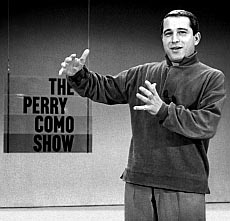
Eddie Fisher joined Perry in '52 for a two-sided-hit duet single, "Maybe" and "Watermelon Weather." Como's arm had to be twisted to get him to do the next single; "Don't Let the Stars Get in Your Eyes" had just been a big country hit for its composer, Texan Slim Willet...as well as Arkansan Skeets McDonald, Texan Ray Price and Kentuckian Red Foley (plus, Texan teenager Goldie Hill made an answer song, "I Let the Stars Get in My Eyes")! So..."Why do you want me to sing this hillbilly tune?" asks Perry. "Because it's a hit!" comes the reply from Victor's higher-ups. Ayres devised a clever horn intro and guitar-based arrangement with backing vocals by pop group The Ramblers...and presto! It was America's number one record in January and February 1953. Perry was smart enough to let 'em keep picking the hits for him.
"No Other Love," another Rodgers and Hammerstein song (this one from their Broadway musical Me and Juliet), led the Como hit parade in 1953. "Wanted" was a chart-topper for eight weeks in the spring of '54; it was written by Jack Fulton and Lois Steele (whose "Ivory Tower" became a multiple-artist hit two years later). Other hits that year included the Perry-wouldn't-pick-it dance novelty "Papa Loves Mambo" and his second evergreen Christmas classic, Al Stillman and Robert Allen's "(There's No Place Like) Home For the Holidays." Unlike many of his contemporaries (most of them on their last legs except for Sinatra and a few others willing to adapt), he was willing to experiment with developing rock and roll styles. "Ko Ko Mo (I Love You So)" (written by Forest Gene Wilson, Jake Porter and Eunice Levy) was a rhythm and blues hit in early 1955 for two of its composers, Gene and Eunice. Perry mainstreamed the song without losing all of its rhythmic qualities and took it top ten. RCA's hot new female star Jaye P. Morgan joined him for a duet single, "Chee Chee-oo Chee (Sang the Little Bird)" backed with the Damn Yankees tune "Two Lost Souls." Then Perry did some more light rocking into the top ten with Bob Merrill's "Tina Marie."
A weekly fixture on the tube, Como's appeal kept growing as the number of homes with televisions increased. He returned to NBC in 1955 and freshened things up with announcer-comic Frank Gallop, pop group The Ray Charles Singers (the Fontane Sisters had moved on by then) and a soon-to-be famous theme song, Carl Sigman's "Dream Along With Me.". The network scheduled him on Saturdays, going head-to-head with Jackie Gleason's comedy series The Honeymooners the first season and The Jackie Gleason Show the year after; Gleason, a close friend of Como's, gradually saw his ratings slip and later moved his show to another night. Meanwhile, Perry kept cranking out hit records. "Hot Diggity (Dog Ziggity Zoom)," an Al Hoffman-Dick Manning ditty, rose to the top of the charts in May '56. B side "Juke Box Baby" (penned by brothers Noel and Joe Sherman) was the closest he came to a rock and roll record; the lyrics mention Chuck Berry's "Maybellene," Boyd Bennett's "Seventeen" (also a hit for the Fontane Sisters on their new label, Dot), Smiley Lewis's "I Hear You Knocking," The Moonglows' "Sincerely," Bill Haley's "See You Later, Alligator" and Fisher's "Dungaree Doll." Perry got a little kinky, too, with a Ray Stanley song, "Glendora," placing him in the role of some average schmoe with a crush on a department store mannequin.
Songwriters Lou Stallman and Joe Shapiro, who'd scored a hit with "Treasure of Love" by Clyde McPhatter, handed Mr. C a song that landed him at number one yet again. His spring '57 smash, "Round and Round," crested right before labelmate Presley's "All Shook Up," the year's biggest single, took over the top spot. A two-sided hit in '58 sold a million; "Catch a Falling Star" was written by rising composers Paul Vance and Lee Pockriss and its flip side, "Magic Moments," was an early effort by the successful team of Hal David and Burt Bacharach. Perry Como's Kraft Music Hall was the new title of his variety show in the fall of 1959, as it moved from Saturday to Wednesday. Como won five Emmy awards between 1955 and 1959 in various categories: Best Male Singer, Best Program Host, Best Male Personality and Best Actor.
Highlights from his 1960s hit string include "Delaware" (as in 'What did Della wear?') by Irving Gordon (with tons of puns involving U.S. states, and it's pure corn: 'Oh, what did Missi-sip, boy?...She sipped a Minne-soda!') in '60, Earl Shuman and "Bugs" Bower's "Caterina" ('...ah, ha, ha!') in '62 and the Al Stillman-Henry Mancini song "(I Love You) Don't You Forget It" (...that makes seven times that I've said it!') in '63. His TV series left the weekly schedule in 1963 but a series of specials (many of them Christmas shows) aired for several years. His last studio session with Mitchell Ayres took place in N.Y. that spring, after which he rested for about a year and a half. In 1965, refreshed and ready for a change of scene, Perry resumed recording...in Nashville! Adjusting to a smaller group of musicians in a more free-form atmosphere took some getting used to, but he scored a hit right off the bat and figured he'd stumbled into a good thing. "Dream on Little Dreamer," by country songwriters Jan Crutchfield and Fred Burch, reached the top 40 and went top ten on the Middle-Road Singles chart (changed shortly afterwards to Easy Listening), representing the pop-format radio stations emerging at the time, a chart he would be be making regular appearances on for several years.
Como's staying power was phenomenal, his fans loyal in a way few artists can boast. His 1969 hit "Seattle" (composed by Ernie Sheldon, Jack Keller and Hugo Montenegro) became familiar as the theme for the ABC-TV series Here Come the Brides, one highlight in the career of classic film actress Joan Blondell and a big break for singer Bobby Sherman. In late 1970, Como made the charts with an English translation of a Spanish song, "Somos Novios." Sid Wayne penned lyrics for Yucutan-born composer Armando Manzanero's melody. The title describes, perhaps, what some felt were Perry's chances of having hit records for more than 30 years: "It's Impossible." The single hit the top ten in early 1971, receiving radio airplay side-by-side with concurrent hits like "Immigrant Song" by Led Zeppelin...and that's part of the semi-secret formula that kept top 40 radio in the forefront for so many decades!
His next hit, "I Think of You," came courtesy of Francis Lai and Rod McKuen. Como triumphed again with Don "American Pie" McLean's "And I Love You So," a top 40 hit from May through July of 1973. Steady concert performances kept him busy and he recorded for RCA into the late 1980s. He continued doing one or two television specials each year through '86 with one final concert that was televised in 1994, seven years before his death at age 88. During the 1980s, the comedy series SCTV had parodied his laid-back "Mr. Nice Guy" image in skits with funnyman Eugene Levy while bestowing a new nickname upon him: "Mr. Relaxation." Perry Como took it all in good humor, consistent with the image he conveyed over the course of more than 60 extremely successful years in show business.
NOTABLE SINGLES:
- You Can't Pull the Wool Over My Eyes - 1936
by Ted Weems and his Orchestra, vocal chorus by Perry Como - Goody Goodbye - 1940
by Ted Weems and his Orchestra, vocal chorus by Perry Como - It All Comes Back to Me Now - 1941
by Ted Weems and his Orchestra, vocal chorus by Perry Como - Deep in the Heart of Texas - 1942
by Ted Weems and his Orchestra, vocal chorus by Perry Como - Goodbye, Sue - 1943
- Have I Stayed Away Too Long? - 1944
- Long Ago (And Far Away) - 1944
- I Dream of You (More Than You Dream I Do) - 1945
- Temptation - 1945
- I'm Gonna Love That Gal (Like She's Never Been Loved Before) /
If I Loved You - 1945 - Till the End of Time - 1945
- Dig You Later (A Hubba-Hubba-Hubba) - 1946
with the Satisfyers - I'm Always Chasing Rainbows - 1946
with the Satisfyers - Prisoner of Love - 1946
- They Say it's Wonderful - 1946
- Surrender - 1946
- Winter Wonderland - 1946
- Chi-Baba Chi-Baba (My Bambino Go to Sleep) - 1947
with the Satisfiers /
When You Were Sweet Sixteen - 1947 - I Wonder Who's Kissing Her Now - 1947
by Ted Weems and his Orchestra, vocal chorus by Perry Como - Because - 1948
- Haunted Heart - 1948
- Rambling Rose - 1948
- Far Away Places - 1948
- N'yot N'yow (The Pussycat Song) - 1949
with the Fontane Sisters - Blue Room - 1949
- Forever and Ever /
I Don't See Me in Your Eyes Anymore - 1949 - "A" - You're Adorable - 1949
with the Fontane Sisters - Some Enchanted Evening /
Bali Ha'i - 1949 - Let's Take an Old-Fashioned Walk - 1949
- A Dreamer's Holiday - 1949
with the Fontane Sisters - I Wanna Go Home (With You) - 1949
with the Fontane Sisters - The Lord's Prayer /
Ave Maria - 1949 - Bibbidi-Bobbidi-Boo (The Magic Song) - 1950
with the Fontane Sisters - Hoop-Dee-Doo - 1950
with the Fontane Sisters - I Cross My Fingers - 1950
with the Fontane Sisters - Patricia - 1950
- A Bushel and a Peck - 1950
by Perry Como and Betty Hutton - You're Just in Love - 1951
with the Fontane Sisters - If /
Zing Zing-Zoom Zoom - 1951 - There's a Big Blue Cloud (Next to Heaven) - 1951
- It's Beginning to Look Like Christmas - 1951
with the Fontane Sisters - Tulips and Heather - 1952
- Maybe - 1952
by Perry Como and Eddie Fisher / - Watermelon Weather - 1952
by Perry Como and Eddie Fisher - Don't Let the Stars Get in Your Eyes - 1953
- Wild Horses - 1953
- Say You're Mine Again /
My One and Only Heart - 1953 - No Other Love - 1953
- You Alone (Solo Tu) /
Pa-Paya Mama - 1953 - Wanted - 1954
- Hit and Run Affair - 1954
- Papa Loves Mambo /
The Things I Didn't Do - 1954 - (There's No Place Like) Home For the Holidays - 1954
- Ko Ko Mo (I Love You So) - 1955
- Chee Chee-oo Chee (Sang the Little Bird) - 1955
by Perry Como and Jaye P. Morgan / - Two Lost Souls - 1955
by Perry Como and Jaye P. Morgan - Tina Marie /
Fooled - 1955 - All at Once You Love Her /
The Rose Tattoo - 1955 - Hot Diggity (Dog Ziggity Zoom) /
Juke Box Baby - 1956 - Glendora /
More - 1956 - Somebody Up There Likes Me /
Dream Along With Me - 1956 - Moonlight Love /
Chincherinchee - 1956 - Round and Round /
Mi Casa, Su Casa - 1957 - The Girl With the Golden Braids /
My Little Baby - 1957 - Dancin' - 1957
- Just Born (To Be Your Baby) /
Ivy Rose - 1957 - Catch a Falling Star /
Magic Moments - 1958 - Kewpie Doll - 1958
- Moon Talk - 1958
- Love Makes the World Go 'Round /
Mandolins in the Moonlight - 1958 - Tomboy - 1959
- I Know - 1959
- Delaware /
I Know What God Is - 1960 - Make Someone Happy - 1960
- You're Following Me - 1961
- Caterina - 1962
- (I Love You) Don't You Forget It - 1963
- Dream on Little Dreamer - 1965
- Oowee, Oowee - 1965
- Coo Coo Roo Coo Coo Paloma - 1966
- Stop! And Think it Over - 1967
- You Made it That Way (Watermelon Summer) - 1967
- The Father of Girls - 1968
- Seattle - 1969
- It's Impossible - 1970
- I Think of You - 1971
- And I Love You So - 1973


